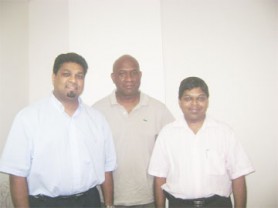The Caribbean Heart Institute (CHI) yesterday announced the inclusion of a resident interventional cardiologist on its local team, a step which it hailed as significant because the institute now has the ability to handle emergency cardiac problems.

The institute recruited Dr Pratik Soni from India a short while ago and he joined the staff at CHI last week. Dr Soni has been practicing cardiology for the past 13 years and is currently a Senior Consultant of interventional cardiology.
He joins CHI as an expert in the field of Echocardiography, Colour Doppler, Tee Ambulatory ECG monitoring (holter), Ambulatory BP monitoring and Nuclear Cardiology.
Previously, CHI lacked the capacity to handle emergencies, which often resulted in patients waiting as long as three months after having angiograms before seeing a cardiologist. But with an interventional cardiologist on the ground, CHI is now equipped to offer emergency stenting within hours if the patient requires it.
Chief Executive Officer of CHI, Dr Gary Stephens told Stabroek News on Saturday, that they now have the ability to handle acute heart attacks, noting that CHI is moving to eliminate the hassle of rushing heart patients who require immediate care overseas, which costs “thousands of dollars”. He said CHI decided to hire Dr Soni and have him on the ground.
According to him, the decision to have a resident interventional cardiologist is costly but he is also of the opinion that it is worth it.
Dr Stephens underscored the kind of impact Dr Soni would have at the institute and by extension the country saying, “This is huge for us because a lot patients some of whom are very serious have died waiting for the procedure.”
He noted that emergency angioplasty is rare, adding that Guyana now has that capacity. “We have had patients who have had to wait three months after having angigograms and now they can have an angiogram and stenting on the same day,” he added.
He said Dr Soni “functions on his own”, explaining that the Indian trained doctor has the ability to do other peripheral interventions like looking at people with kidney problems among other things. But there is a huge cardiac problem in the country, he said, stressing that Dr Soni is not an ordinary cardiologist. “If you have a heart attack Dr Soni is here so you can come into the hospital,” he said.
The standard in cardiac interventions is getting the patients to the hospital in 90 minutes, Dr Stephens said, pointing out that if the patient is at the hospital within that period they can be saved.
Speaking on his role at CHI, Dr Soni said that he is there to offer care to patients with heart problems “at any hour”.
He said anyone experiencing chest pains whether late at night or early in the morning simply has to visit the institute and can expect treatment after the problem is diagnosed. But he noted that this depends on how fast the patient reaches CHI. He said too that his wife who is a paediatrician has also moved to Guyana and will join the team at Georgetown Public Hospital.
Dr Stephens disclosed during the interview that a visiting team conducted three valve replacement surgeries over the weekend and according to him the patients are doing well. He said one of the patients had two valves repaired, the first time such a surgery was ever done here. He noted that CHI waiting list has been cut down significantly, not solely from them operating but from people also opting for treatment elsewhere. He said too that others have died while waiting.
Still, he said, there is a considerable waiting list which has been constant at around 40 patients. But he said interventional cardiology is advanced and at such a stage that rarely now is there a need for emergent cardiac surgery.
He said the patients they operate on now are having elective surgery which includes valve replacement and bypass surgery. He said also that CHI would like to see surgery happen more often, but it was still limited because there is no one to operate the heart-lung machine. Recently, someone commenced training in US and would soon join the team.
He also revealed that CHI has recruited the services of Dr Ghanshan Singh, a board certified internist. Dr Singh previously worked at Georgetown Public Hospital but had migrated to the US. He has returned to home to offer his services at CHI. Dr Singh said yesterday that he is there to treat patients with heart disease.
He will also screen patients with congenital problems such as hypertension, diabetes, cholesterol problems. He said he is interested in detecting, screening and classifying who needs what type of intervention and that he would also assist with post-op care.
Further, Dr Stephens said CHI is moving apace with plans do pediatric cardiac surgery in January 2010. “That is the plan right now, sometimes the best ones don’t work out but we are working towards it”. He disclosed that a paediatric cardiologist from Mount Sinai hospital in the US was also here over the weekend reviewing patients to prepare a list for surgery next year. If the plan bears fruit, he said, Mt Sinai hopes to liaise with the public hospital, particularly as it relates to bed space.
CHI opened its doors to the public in October 2006 and had promised a comprehensive heart care programme. Stenting which involves the insertion of a wire mesh tube during angioplasty to prop open an artery and angioplasty were among services phased in by the institute prior to bypass surgeries.
Dr Stephens had previously stated that persons who are approved for the surgery would be given a package deal and a separate deal for the medication. The CHI has an arrangement with the government and private sector. Members of the public are being facilitated for surgery through the efforts of the Ministry of Health. Surgery is being offered at a cost far less than it would be overseas.




